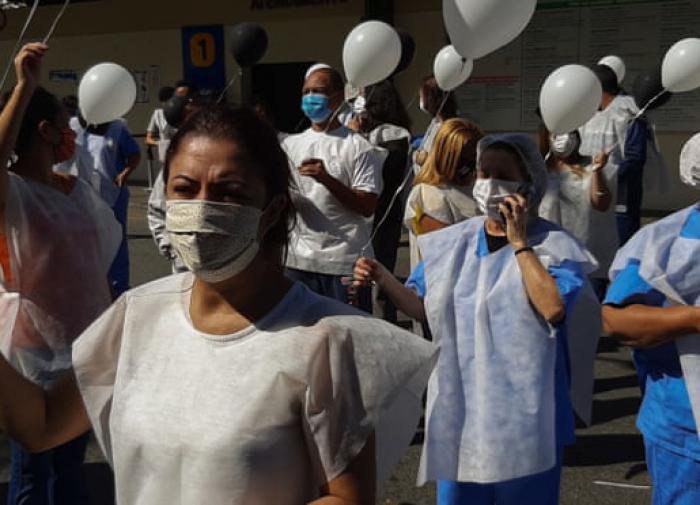Brazil on the brink of another revolution
Due to the catastrophic results that the COVID-19 pandemic has caused in Brazil, President Jair Bolsonaro pins his hopes on the military.

Establishing a dictatorship in Brazil is a piece of cake
Bolsonaro emphasized that he, as the Supreme Commander of the Armed Forces, could take extreme measures in the country if the people wanted so.
"How easy it is to establish a dictatorship in Brazil," he said twice, communicating with the population via social media.
Bolsonaro is not a champion of strict quarantines. Regarding the restrictive measures imposed by the authorities of many states (Brazil is a federation), Bolsonaro said that those measures tend to spark protests and revolts of the population."
"A hungry man loses his mind. We are holding on to the country. I predict a major problem in Brazil. I do not want to say what these problems are, because I do not want them (opponents) to say that I encourage violence. But we will have serious problems ahead of us," Jair Bolsonaro said.
The pressure on Bolsonaro will continue to grow after the Federal Supreme Court (STF) overturned the conviction of former President Luis Inacio Lula da Silva (Labor Party, PT), who was sentenced to prison in the Car Wash case.
Lula, as opinion polls show, had had a big advantage over Bolsonaro before the 2018 elections, but the court verdict removed him from the race. Not that long ago, Lula was reinstated in his voting rights. He does not deny that he may run for president in 2022.
The reaction from Reserve General Luis Eduardo Rocha Paiva to the STF decision drew a massive response in Brazil. His post published on the Clube Militar website on March 9 says that "the crucial moment was coming. PT supporters (the party's color is red) call Bolsonaro a "fascist" and intimidate him with the loss of "fragile democracy" in the country.
Brazilian President enjoys public support
Bolsonaro's WhatsApp groups have also responded to STF's decision and called for military intervention, impeachment of judges, and a mail-order vote in the 2022 elections.
Bolsonaro is a former military man, a non-partisan, who won primarily with the help of his anti-corruption slogans.
His electorate includes nationalists, "anti-communists" (as they call themselves) and the middle class of Brazil. All those people are strongly opposed to face masks and lockdowns. Bolsonaro's electorate differs greatly from the liberal public that Michel Timer personified.
Since Bolsonaro did not have his own team and political strategists behind his back at the beginning of his presidency, the president decided to recruit supporters from military ranks. Studies have shown that the percentage of former and current military personnel on key positions (leadership, coordination) at government institutions has doubled and reached 343 people during his presidency. In relative terms, the percentage of military personnel on top positions has grown from 2.4 percent at the end of Dilma Rousseff's presidency to three percent under Michel Temer and currently makes up 14 percent.
Presently, after two years of rule, the government (headed by the president) starts taking control of the state machine, at least to a certain extent.
Unlike the liberal Temer, Bolsonaro does not support the privatization of state-owned companies, such as Eletrobras and Petrobras. He views oil and energy as a factor of national security and put military officials at the head of these companies.
- In a recent poll conducted by Paraná Pesquisa, 50 percent of the polled consider the presence of military officials in the public administration to be a positive factor, while 36.4 percent believe otherwise.
- The same survey showed that 62.1 percent of respondents do not currently see the risk of a military coup in the country.
The left-wing press in Brazil claims that instead of taking sanitary and economic measures to guarantee the preservation of people's lives, the president throws the country into chaos to come out of the crisis as a national hero and saviour afterwards.
"There are such examples in world history: Hitler in Nazi Germany, Mussolini in Italy or Francisco Franco in Spain and the military, who came to power in Brazil in 1964," the left-wing Rede Brasil Atual newspaper wrote.
Brazil had lived under military dictatorship from 1964 to 1985. In order to prevent communist dictatorship in Brazil during the Cold War, Brazilian armed forces carried out a coup d'etat and toppled then President João Goulart.
PT's left-wing government ruled Brazil for 12 years. After the impeachment of Dilma Rousseff (Lula's heiress) elections in 2018, Bolsonaro won the election in 2018 with 55.1 percent of votes that he gained in the second round. His PT rival Fernand Haddad received the support from 44.87 percent of voters.
Bolsonaro refused to promote the Sputnik V vaccine in the country under pressure from the United States (Lula would never act so), but the northeastern states, where PT's influence is undoubtedly great, took urgent measures to purchase it owing to direct ties with the Russian Direct Investment Fund.
Brazil fails to cope with coronavirus
Brazil is currently going through its worst times since the start of the pandemic. The country's health care system is exhausted. Intensive care units for COVID-19 patients are 80 percent full in 20 of the 27 regions of the country. In half of the Brazilian states, the number exceeds 90 percent.
Jair Bolsonaro announced the appointment of a new Minister of Health. Cardiologist Marcelo Queiroga will become the fourth head of the department in two years. General Eduardo Pazuello is leaving office against the backdrop of investigation into the collapse of the health care system in Manaus.
Subscribe to Pravda.Ru Telegram channel, Facebook, RSS!


